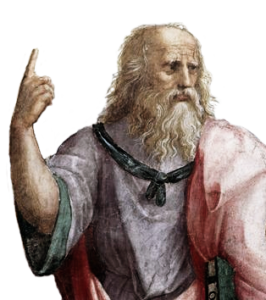Hegel über Platon 002

Parte de:
Lecciones de Historia de la Filosofía [Vorlesungen über die Geschichte der Philosophie] / Primera parte: La Filosofía Griega [Erster Teil: Griechische Philosophie] / Sección Primera: de Tales a Aristóteles [Erster Abschnitt. Von Thales bis Aristoteles] / Capítulo 3: Platón y Aristóteles [Drittes Kapitel: Platon und Aristoteles] / A. Platón [A. Philosophie des Platon]

Tabla de contenidos
Vorlesungen im Atrium Philosophicum §2
Eins der schönsten Geschenke, welche uns das Schicksal aus [11] dem Altertum aufbewahrt, sind ohne Zweifel die Platonischen Werke. Seine Philosophie aber, die in ihnen nicht eigentlich in systematischer Form vorgetragen ist, daraus darzustellen, ist nicht so sehr durch sie selbst erschwert als dadurch, daß diese Philosophie von verschiedenen Zeiten verschieden aufgefaßt worden, besonders aber von den plumpen Händen neuerer Zeiten vielfach betastet worden ist, die ihre rohen Vorstellungen entweder da hineingetragen, unvermögend das Geistige geistig zu fassen, oder dasjenige für das Wesentliche und Merkwürdigste in Platons Philosophie angesehen, was in der Tat der Philosophie nicht angehört, sondern der Vorstellungsweise. Eigentlich aber erschwert nur Unkenntnis der Philosophie die Auffassung der Platonischen Philosophie.
Platon ist eins von den welthistorischen Individuen, seine Philosophie eine von den welthistorischen Existenzen, die von ihrer Entstehung an auf alle folgende Zeiten für die Bildung und Entwicklung des Geistes den bedeutendsten Einfluß gehabt haben; die christliche Religion, die dies hohe Prinzip in sich enthält, ist zu dieser Organisation des Vernünftigen, zu diesem Reiche des Übersinnlichen geworden durch den großen Anfang, den Platon schon gemacht hatte. Das Eigentümliche der Platonischen Philosophie ist die Richtung auf die intellektuelle, übersinnliche Welt, die Erhebung des Bewußtseins in das geistige Reich, so daß das Intellektuelle die Gestalt von Übersinnlichem, von Geistigem, was dem Denken angehört, erhält, daß es in dieser Gestalt für das Bewußtsein die Wichtigkeit bekommt, in das Bewußtsein eingeführt wird und das Bewußtsein einen festen Fuß in diesem Boden faßt. Die christliche Religion hat dann das Prinzip der Bestimmung des Menschen zur Seligkeit – oder daß sein inneres geistiges Wesen sein wahrhaftes Wesen ist – in ihrer eigentümlichen Weise zum allgemeinen Prinzip gemacht. Aber daß dies Prinzip organisiert ist zu einer geistigen Welt, daran hat Platon und seine Philosophie den größten Teil gehabt.[12]
Praelēctiōnēs in Ātriō Philosophicō §2
Uno de los más preciosos regalos que desde la Antigüedad nos ha traído el destino es el conjunto de las obras platónicas. Pero presentar su filosofía, que en realidad no se presenta de manera sistemática en ellas, se hace más difícil no tanto por sí misma sino por el hecho de que esta filosofía ha sido entendida de distinta manaras en diferentes épocas. Especialmente ha sido manoseada muchas veces por las torpes manos de los tiempos modernos. Éstas manipulaciones son la que, o bien han traído sus ideas en bruto, incapaces de aprehender espiritualmente lo espiritual, o consideraron esto como lo más esencial y extraño en la filosofía de Platón; cuando en realidad esto no pertenece a su filosofía, sino la manera de imaginar. De hecho, sólo la ignorancia de la filosofía torna difícil el entender la filosofía platónica.
Platón es una de las figuras histórico-universales y su filosofía una de esas existencias de la historia universal que, desde su mismo nacimiento, ejercen la más importante influencia sobre todos los tiempos venideros, en cuanto a la formación y al desarrollo del espíritu. En efecto, lo característico de la filosofía platónica es, precisamente, esa orientación hacia el mundo intelectual y suprasensible, la exaltación de la conciencia al reino espiritual; de tal modo que lo espiritual, lo que pertenece al mundo del pensamiento, cobra importancia, bajo esta forma, para la conciencia y encuentra el camino hacia ella, y, a la inversa, la conciencia empieza a pisar firme en este terreno. También la religión cristiana eleva a principio general este alto principio según el cual la esencia espiritual interior del hombre es su verdadera esencia, aunque sea de un modo propio y peculiar, es decir, viendo en ello el destino del hombre a la bienaventuranza: y así, bien podemos afirmar que Platón y su filosofía contribuyeron en una parte importantísima a que aquel modo de concebir se convirtiese en esta organización de lo racional, en este reino de lo suprasensible, pues no en vano fue Platón quien dio el primer paso por este camino.
Perge ad initium paginae huius
Lectures at the Atrium Philosophicum §2
The preservation of Plato’s works is one of the finest gifts of fate. They are both engaging and important, in form and content alike. Plato is one of the ‘world-historical’ [welthistorisch] individuals, and his philosophy is one of the ‘world-historical’ phenomena [Existenzen] that, from their very inception onwards, have had the most significant influence on the formation and development of spirit in all subsequent eras. The Christian religion, which contains this sublime principle [of spirit] within it, came to be the means of organization of the rational domain, became the supersensible realm that it is, because the soil of the supersensible domain had already been tilled by the great beginning that Plato made. The characteristic feature of the Platonic philosophy is its orientation toward the intellectual or supersensible world, its elevation of consciousness into the spiritual realm, so that the intellectual domain takes on importance for consciousness in the shape of the supersensible, the spiritual element that belongs to thinking; the supersensible is introduced into consciousness in such a way that consciousness gains a permanent foothold in this soil. The principle of the Christian religion is, then, that the human vocation is for blessedness. In other words, it has, in its own distinctive fashion, made into its universal principle the fact that our inner or spiritual being is our true being, But Plato and his philosophy played the greatest part in the systematizing of this principle and in its organization into a spiritual world.
